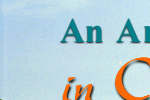 |  |  |  |
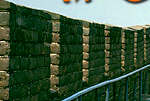 | 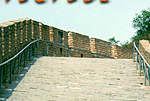 |  |  |
 |  | 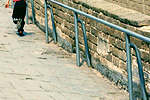 | 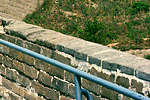 |
 |  |  | 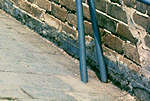 |
|
December 6, 2002 Crackdown! |
|
I feel pretty safe in my little netbar across from one of the biggest vegetable/meat/fish/assorted goodies markets in Chengdu. I am surrounded by Diablo (the latest computer game craze to take China by storm) playing young fellows, dirty side streets, hot pot stalls and peasant construction workers tearing down the old city. If I walk a couple of blocks to the Mother River, I enter one of the more privileged parts of town. Here one finds high-end apartment complexes being built next to already existing high-end apartment complexes, empty but grandiose shopping malls and the dust of last centuryís streets and shacks. On the second floor of one of these ugly-yet-modern buildings is the new wave of netbar sweeping the nation. Clean, huge and equipped with RMB5000 computers, ADSL and the latest games, these netbars are no more expensive than the run-down dirty one I visit and they serve coffee and tea to boot. Unfortunately, these new netbars are also card-based. Users are issued a card after they present their passport or identification card and these cards carry certain perks – free cup of Joe after the 1 millionth use and so on. Last month, several of these new bars opened up for business with a fresh, gleaming, golden plaque atop the reception desk proclaiming the endorsement of Chengduís finest. They also close at midnight – or should at least. A new nationwide ordinance requires all net surfers to present identification so that their activities can be monitored by the proper authorities. Enforcement is spotty – due to the proliferation of hole-in-the-wall netbars – but rest assured that every new net bar applying for a license must abide by these rules. The owners of the Red Star Net Bar in the affluent district are not any richer than the owners of the hole I visit, but they receive a hefty subsidy from the local government in exchange for their cooperation in keeping the public misinformed. Duan, the boss of my net bar, shrugs aside the regulations. "If they donít come and search, which they wonít, then there is no problem. Weíre too small for (the police) and they have no time to bother with us." Coming on the heels of the Harvard Law School study that confirmed what net users in China already knew – that the government is definitely behind the slow connections, unreachable sites and pointed punishment of those who check out "subversive" information – this seems to be naught but a continuation of Old Dengís Open Door with a Very Visible Iron Hand policies. Amazingly, with all the money and time spent on blocking 20,000-odd sites, the pop up sites when I open my browser are usually porn sites of some kind. Whatís worse is that the government, according to the study and my own web surfing experience, is doing a decent job of controlling the flow of information. Ashcroft must be licking his chops ... Article 23 Hong Kong, duped into believing that Beijing would keep its paws off of the Special Administrative Region after handover, is now facing a nigh-inevitable lockdown of civil liberties under the ambiguous and typically Chinese-worded Article 23. This legislation covers subversive activities, sedition, incitement, unauthorized disclosure of state secrets and otherwise nasty anti-government doings. The Falun Gong, a favorite whipping boy of Jiang, is able to practice unmolested in Hong Kong and I have always wondered how long that will last. A recent conviction in Hong Kong of several teenagers engaged in an "illegal peace protests" under the Public Order Ordinance was seen as foreshadowing for future prosecutions under Article 23 and the future of Hong Kong in general. The South China Morning Post has not exploded all over the story as one would hope, but ever since the appointment of Tung Chee-Hwa as Beijingís boy in Hong Kong, the paper has come under fire for being less aggressive in reporting on the mainland than it could be. Secertary of Security, Regina Ip Lau Suk-Yee has watched her popularity drop even as she rigiorously defends Article 23 as a "necessary tightening" of existing laws which will be interpreted correctly by Hong Kong courts. She bases her defense on the ability of the courts to remain politically neutral and to interpret words such as "incitement" and "intimidation" according to common law and not Beijing law. Of course, the courts in Hong Kong need to become politically neutral first. Then perhaps they should move out of Tung Chee-Hwa/Beijingís shadow. The consequences of making Article 23 part of the basic law could be disasterous for the SAR if the US Congress listens to the neo-con lobbyists warhawking about the capitol. Kagan and Kristol and all of their buddies from the AEI and elsewhere see the legislation as an opportunity to revoke the special trade priviliges Hong Kong enjoys with the US, thereby weakening its economy and the economy of China as a whole. Opponents of the legislation have used threats of a stampede of international investors out of Hong Kong, but these threats carry no weight – just a little bit west of Hong Kong lies an enormous country with a long tradition of enforcing Article 23-like laws and the suits just canít stop talking about the opportunites a newly capitalist dictatorship presents to the wealthy and morally rudderless. Hong Kong business might do even better if the people are docile and frightened. AIDS Awareness? Vending machines are pretty rare in the west of China to begin with. So I looked with mild interest at the new (empty) one downstairs from my apartment. I was then stopped in my tracks as my friend pointed out that the machine was empty but for a row of – condoms. Now this is new. I have seen condoms for sale at Ito Yokado, the Japanese "we have it all!" store competing with Franceís Carrefour for dominance of the super-market. I have also seen condoms, toys, lacy underwear, crazy thongs and other tools of the oldest trade being sold next to massage parlors and brothels. But a vending machine is something new. That same day I watched a discussion of AIDS on CCTV 9ís Dialogue. Then I came to know the truth. Open Door/Iron Hand was still in full effect. A decent discussion, guided forcefully and crudely along the road through political sensitivity. The speakers, representing a Hong Kong AIDS Awareness NGO and an American NGO based in Beijing, did their best to get the message out that misinformation would result in an epidemic, while evading questions meant to steer the conversation toward gays, drugs and whether or not kissing is dangerous. The show is in English, so right there 90 percent of the population will understand nothing. They also edited, quite sloppily I might say, the words "prostitution" and "prenatal" when the causes for the spread of AIDS were being discussed. And as always, the discussion kept coming back to the role of those evil drug users, whores and foreigners who are bringing this disease into China. No mention of the millions of businessmen, peasants, workers, teenagers etc. who keep the prostitutes busy. Or the ingrained aversion to sex education that keeps young people confused as to whether saliva can carry the virus or only drug users and "bad people" catch it. On December 1st, the Open Door part of China ran several articles about AIDS, even going so far as to admit that an epidemic might exist, that peasants were vulnerable and that innocents should not be shunned. The Iron Hand aspect solemnly pronounced that Chengdu has 273 cases of which 268 are either drug users or prostitutes. Even if Huís new government seems bent on cracking down to keep stability in the years to come, people are resourceful and the long arm of the law doesnít extend into oneís brain. More and more young Chinese are using condoms, are well informed about AIDS, have computers at their homes and have learned to conduct "subversive activities" amongst those whom they trust. As long as this part of society still exists, crackdowns will be periodical and ineffective, instead of powerful and permanent. –Sascha
Matuszak
Please Support Antiwar.comSend contributions to Antiwar.com or
Contribute Via our Secure Server Your contributions are now tax-deductible
|
Sascha Matuszak
is a teacher living and working in China. His articles have appeared
in the South China Morning Post, the Minnesota Daily,
and elsewhere. His exclusive Antiwar.com column (usually) appears
Fridays. Archived columns Jiang's
Theory Is a Smokescreen 'We
Make You Play Bad Card' The
Future of East-West Rapprochement Tiananmen's
Legacy: The Forgotten Rebellion Deciphering
the Chinese Smile Why
China Can Disregard US Anger Arming
the World: What the US Fears 1.3
Billion Problems For China China's
New Post-9/11 Status
Sweep 'Em Off the Streets
Chinese Embrace Progress China's
Afghan Agenda New
War May Reveal New Superpower, Part II New
War May Reveal New Superpower A
Chance for a New Friendship? Cheating
as a Way of Life China's
Internet Generation Free
Markets or Supermarkets Sailing
Towards World Significance China's
Youth Revolution |
